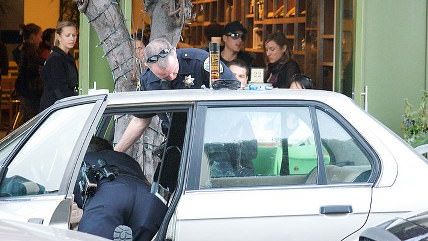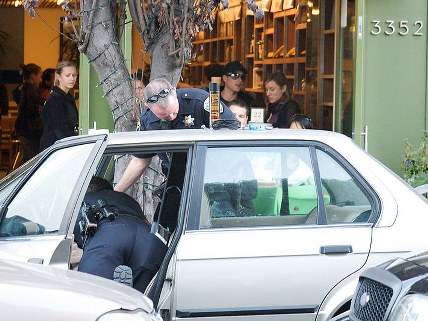Ferguson, Abusive Policing, and Racial Politics
The fatal police shooting of 18-year-old Michael Brown and its aftermath have once again brought the national spotlight on race relations.


The tragedy and turmoil in Ferguson, Missouri—the fatal police shooting of 18-year-old Michael Brown, followed by sometimes violent protests and a heavy-handed police crackdown—have once again brought the national spotlight on race relations in America. It has also revealed unusual political alignments, with libertarian-leaning Republican Kentucky Senator Rand Paul and some other libertarians and conservatives joining liberals and leftists to denounce abusive police behavior, particularly toward young African-American males. Others on the right—not only Rush Limbaugh but black commentators such as Jason Riley—are taking a more traditional conservative view which sees the black community's worst woes as due not to racism but to its own cultural problems, aggravated by the welfare state and liberal paternalism.
Each of these narratives—"racial injustice" and "cultural dysfunction"—has its truths and its blinders. Each, by itself, is overly simplistic and (as it were) black and white, both with regard to the situation in Ferguson and with regard to the larger picture.
What are the facts in Ferguson? For starters, we can all agree that the Ferguson police department couldn't have done a worse job of handling the crisis from the start. Leaving Michael Brown's body lying in the street for hours, treating protesters and journalists like the enemy in a war zone, stonewalling on the identity of the officer who shot Brown and then releasing it together with information about Brown's involvement in a convenience store robbery—it seems as if, every time the cops had to make a decision, they made the one most likely to inflame anger.
Pending a full independent investigation, we don't know the exact circumstances of Brown's death at the hands of Officer Darren Wilson—an army of armchair experts notwithstanding. We don't know how relevant the robbery, captured on a security camera video, may be. Its disclosure, denounced as a "smear," was certainly poorly timed—and further bungled by contradictory police statements on whether Wilson knew Brown was a suspect. Still, George Washington University law professor John Banzhaf, no right-winger, argues that the video may be valid evidence: if Brown had just committed a crime, that makes it more plausible that he could have been aggressive in his encounter with the police. Given that early reports portrayed Brown as quiet and non-confrontational, withholding this information seems hard to justify from an accuracy-in-reporting standpoint. Had officials kept it from the media, there would have been a strong chance of a leak followed by claims of a politically correct cover-up.
Actual smears of Brown as a "violent gun-toting gang-banger"—based on nothing more than photos of hand gestures said to be "gang signs," most likely the posturing of a teen who wanted to be a rap artist—have appeared on some far-right websites. These and other posts in the right-wing blogosphere are a sobering reminder of how easily the "cultural dysfunction" narrative can cross the line into racism—which is thick, overt, and vile in the reader comments. Yet Brown's defenders have shown biases of their own, however well-meaning—for instance, dismissing the store robbery as "petty theft" or "shoplifting," even though the assault on the clerk who tried to stop Brown clearly raises the level of the offense to "strong-arm robbery." Left-wing activist and blogger Olivia Cole dismisses as a troll anyone who talks about waiting for the evidence and deplores (seriously!) "riot-shaming."
Beyond the specifics of the Ferguson situation, there is the bigger issue of the relationship between the police and the black community—actually, a tangled web of difficult issues.
There is the general problem of a police culture that often harbors authoritarian attitudes—starkly illustrated by the much-discussed Washington Post column by Los Angeles police veteran Sunil Dutta blaming most police/civilian conflicts on insufficiently submissive civilians—and fosters an "Us vs. Them" mentality that views citizens as a hostile element to be kept in place. Demographically, I'm very near the top of the totem pole as far as police interactions go—female, white, middle-class, conventionally dressed—but even I have unpleasant memories of a routine traffic stop during which I was brusquely told not to argue with the police officer's rather dramatic overestimate of my speed, and then ordered to state my exact destination.
In many cases, this mentality leads to the shielding of police misbehavior and lack of accountability—even when someone winds up dead. It's not just about race or even class; last week, Politico magazine published the troubling account by retired Air Force Colonel Michael Bell (who is white) of his unarmed son's shooting by a police officer during a routine traffic stop, with no consequences to the shooter. The post-Ferguson shooting in St. Louis, Missouri of a knife-wielding, mentally ill African-American man, Kajieme Powell, has prompted many comments to the effect that no white person would be so cavalierly gunned down. But one can easily find recent instances of mentally ill white people—such as South Carolina teenager Keith Vidal last January, or disabled 51-year-old National Guard veteran Brian Newt Beaird in Los Angeles last December—being shot under dubious circumstances.
What happens when race is added to the mix? There is no question that young black males are killed by the police in disproportionate numbers. African-Americans make up about 13 percent of the population of the United States; according to various statistics, they account for 32 to 41 percent of Americans killed by law enforcement and 28 percent of arrests. At least some of this gap is clearly related to the demographics of violent crime. An analysis of shootings in New York City in 2011 finds that blacks, about 22 percent of city's population, were the targets in about half of police shootings—and the suspects in 70 percent of criminal shootings in which the suspect's race was identified.
Conservative analysts, most notably Manhattan Institute fellow Heather MacDonald, argue that all racial disparities in arrest and incarceration are due to differences in crime rates and that racism in the criminal justice system is a myth. That too is an oversimplification. Some of the studies MacDonald cites actually find that the demographics of crime are the primary, not the sole, reason for those gaps; there is documented evidence of black and Hispanic defendants being treated more harshly than otherwise similar white offenders. But it's also difficult to take the liberal narrative seriously when it results in such fallacies as writer Jamelle Bouie's purported debunking of the "myth of black-on-black crime." The gist of Bouie's argument is that most violence involves same-race victims and offenders, regardless of racial group. True; but, unfortunately, it's no myth that a vastly disproportionate number of intra-racial murders in America—almost 50 percent—are black-on-black.
Commentators as different as black progressive Ta-Nehisi Coates and white conservative Charles W. Cooke have warned that to bring up black-on-black violence in the context of Ferguson amounts to "changing the subject" and "hectoring blacks" instead of confronting the fact that a young black man was gunned down by the police under highly questionable circumstances. But surely there is room to talk about both—as writer John McWhorter demonstrates in his fine recent essay on Brown's killing in The Daily Beast. Otherwise, one gets a jarring sense of cognitive dissonance when MSNBC contributor Michelle Bernard says that incidents such as Brown's shooting are par of a "war on black boys" that could turn into "genocide" with no acknowledgment that black boys are in far more danger of being killed by other young black males than by white cops or vigilantes. Few would disagree with Coates that crime in the black community exists in a historical context of white supremacy and racism. That does not make it any less vital to address these problems.
White conservatives can sound distastefully tone-deaf when discussing race, justice, and the demographics of crime (a risk of which I am well aware as I write this). Thus, in a July 2013 article in the wake of George Zimmerman's acquittal in the killing of Trayvon Martin, MacDonald acknowledges that law-abiding African-American men are often targets of "humiliating" scrutiny and suspicion. Then, she goes on to say, "Here's a proposal: For a good five-year stretch, blacks bring their crime rate down to white and Asian levels. Once it becomes widely understood that blacks are no more likely to steal, rob, rape, or shoot than whites or Asians, we'll see if blacks still elicit the defensive reactions." However solid MacDonald's statistics, this comes across as smug and insulting, if only because there's nothing law-abiding blacks can do to bring down black crime rates.
Yet surely white liberals like The New Republic's Julia Ioffe sound no less smug when they lecture blacks who condemn self-destructive behavior in their community on the perils of "self-flagellation" and "preaching respectability." And both liberals and libertarians can easily forget that, as grave a problem as police brutality is, violent crime takes a horrific toll on low-income minorities—not only because it hurts its immediate victims and strips others of their sense of safety, but because it ravages neighborhoods and businesses and perpetuates the poverty trap. For all the racially charged controversy about New York's stop-and-frisk policy, a poll last October found that two-thirds of the city's black residents wanted it to continue, albeit with changes.
Where do we go from here, other than waiting for the law to take its course in Ferguson? Meaningful police reform would certainly help: more cameras; curbing the use of law enforcement to boost municipal revenues through fines for petty offenses; a hard look at less deadly ways to subdue violent suspects. Most people appreciate the fact that cops have an extraordinarily demanding and stressful job. But that should not be an excuse for bullying or violence, any more than the stress of poverty is an excuse for crime. Law-and-order conservatives should remember that the principle "power corrupts" applies not only to government but to the police.
At the same time, no amount of reform can completely eliminate racial tensions around law enforcement as long as African-Americans are disproportionately involved in crime. That brings us to the much larger unfinished business of racial inequality. The "national conversation on race" is a perennial cliché. But the only way to even get that conversation started is to listen to different voices.

Show Comments (66)